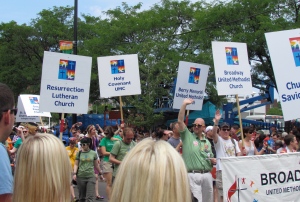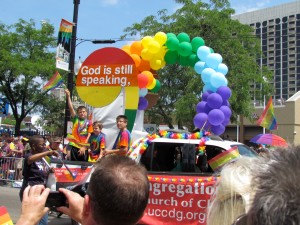This is a piece I shared with at my church a couple years ago.
When a systematic theologian is asked to write a concise statement of what it is she believes, the temptation is to simply repeat the Nicene Creed or some other ecclesial-sanctioned confession of faith and let that ‘timeless classic’ stand for itself. I suppose there are ways in which I could in good faith do this: not that I personally can give rational assent to each aspect of the creed (I’m not unwilling to entertain the idea that there are aspects which might not bear up under the weight of ‘historical’ or scientific scrutiny), but rather that I trust that there are those in the community who can say for me, and therefore hold for me, the things of my faith tradition which I cannot simply hold on my own. I am unwilling to dismiss the witness of those who can hold them.
So how does a closet creedalist find herself at home with a congregation who is proudly (and at times, defiantly) non-creedal and non-dogmatic?
It seems I’ve spent a lot of time in closets in my life—literal and figurative closets. I was a hider as a child. Not that I had anything particularly shameful to keep hidden from others, but I was the child that hid in the hopes of being found. The household I grew up in was passionate about ministry—so much so that as a kid I often felt erased from view in contrast to those with ‘real’ needs (whether physical or spiritual). I tested this theory of erasure at a very early age. My mother reports occasions when she would suddenly become aware of my absence, and eventually find me in repose in the back of a closet somewhere—I’d waited so long for anyone to notice my absence that I’d fallen asleep. I became consciously aware of this personal ritual while my folks were missionaries. At the age of 13 I’d come home from boarding school after having been away for 10 months, closed the door of my bedroom and laid under the bed for hours. I remember quietly playing with the geckos who shared my hiding place, all the while imagining that my parents were frantically searching for me. I emerged, disappointed and unnoticed, only when I was hungry enough to go to the kitchen for food.
I hid in similar closets at boarding school where we missionary kids were indoctrinated with the notion that our parents were out and about doing “the Lord’s will”. Any trouble or infraction we committed was chastised with the fear that if we were disruptive enough to merit parental intervention, we were likely distracting them and preventing them from their real calling—spreading the Good News. Even when circumstances felt abusive or I was just plain homesick, I stayed in my closeted state. I remember our scheduled time on the ham radio early on Sunday mornings—that 10 min weekly window where we could talk ‘privately’ with our parents in the village—with the whole country listening in (what else was there to do when there is no TV or radio?). Their questions of ‘how are you?’ were met with dutiful and respectable closeted answers: “I’m fine.”
During my first seminary degree, I became a closeted woman in a mostly-male school. No, it wasn’t a ‘Yentl’-type moment—I wasn’t into breast binding or cross-dressing. But as one of just a few women out of 350 students, I learned the patriarchal philosophies and theologies that served as currency. I had purchase because I excelled at the argumentative, combative learning style—besting the brightest men around me. I was ‘one of the boys’. Eventually graduating with honors, I was hired as the seminary president’s ghost writer and became professionally closeted—writing sermons and speeches for which he received credit. In my writing I could pass as a man.
I spent years as a young woman, closeted in the heterosexual world where everyone assumes the young are marriages-waiting-to-happen. Just this spring I was invited to speak to the General Executive Council of the American Baptist Churches—USA, and was both surprised and tickled to be introduced as having been invited to speak because they wanted to hear the perspectives of “a young adult”. I joked about this as I took the podium, asking the group just how long I might be able to continue pulling off that moniker—seeing I’m almost 40. One gentleman spoke up and explained, “you are considered a young adult until you get married”. “Wow…” I thought, “I never will reach maturity in your mind, given my orientation.” Apparently, I’m also a closeted adult.
Closets are functional spaces: rooms for shelving and storing the parts of ourselves we aren’t prepared to deal with (either personally or publicly). I believe this is how I’ve remained a closet creedalist at Lake Street Church: the bits and pieces of my faith heritage which don’t quite fit often sit shelved—only to be pulled out and worn on special occasions, if at all. But I’ve also experienced the liberation of spring cleaning, where closets are opened and laundry and baggage are aired. Items are sorted: some cleaned and restored and replaced in the closet to return to someday in the future; these are often items of sentimental value. Other items don’t seem to fit any more—and these are sent out on consignment. Finally, some items are deemed rubbish and are simply trashed.
These periodic spring cleanings do me good. Spring cleaning helps me find hidden treasures—items I’d put away—maybe they were inappropriate for the season, or the size wasn’t right at the time—but are now comfortable and wearable—available for public viewing and consumption. It also reminds me of bits and pieces that were forgotten and repressed and allows me to clean house and open up more space within.
So here I stand before you, out in the open: an uncloseted, single, adult woman who refuses allow her needs and desires go unseen or unheard any longer. It is after all, Pride Sunday. Interestingly, it is also the Sunday of the American Baptist Church’s Biennial Meetings. The irony of the two coinciding is not lost on me.
I believe I’ve also been a closeted Baptist (and I suspect I’m hardly alone in this).
I became a member of Lake Street Church 4 years ago. The decision to join was not undertaken lightly. Oh, it was easy to want to count myself among the members of such an inclusive and warm community. It became more difficult, however, when I realized that joining such a community meant embracing the ‘baptist’ moniker in my professional life. The bi-lines of articles of mine in print would heretofore read, “Baptist theologian”.
Frankly, my Baptist closet was pretty full. As I began sorting through this closet, I discovered all sorts of musty old baggage: stereotypes of Baptists which did not meet my experience with either the leadership or the congregation of LSC (such as blatant sexism, homophobia, and fundamentalism). When I thought “Baptist” it was images of Jerry Fallwell, not Bob Thompson, that immediately came to mind. At the very least, I knew that becoming “Baptist” would raise some eyebrows amongst my feminist colleagues in the academy.
But it was a particular congregation which captured my imagination and forced open the doors of that Baptist closet. And I began to explore the theological underpinnings of what it was that could possibly allow for both the Jerry Fallwells of the world, and the Bob Thompsons of the world, to co-exist under the same rubric. And I was delighted to discover that the theological foundations for such diversity were at the core of Baptist theology itself—understandings of freedoms which all Baptists claim: the freedom to have access to and interpret sacred texts; the freedom of the individual to work out their own spiritual journey in their own unique way; the autonomy and freedom of the local congregation to create communities of grace and justice that are relevant in their particular locales and to their particular congregants; and the freedom of the church from the state.
It turns out that being Baptist provides for the very conditions under which we can be who we are. Being Baptist allows space for me personally to open up my closets and begin that painful but necessary process of spring cleaning.
I suppose what has appealed most about the Lake Street (and therefore Baptist) tradition to this feminist is the inherent modesty in the church’s theological claims. Our divisions are not hidden or protected. Our history and politic is not (nor can it be) swept under the rug. And because opinions range vast, we cannot pretend to speak decisively and representatively ‘for all’. To quote a well-crafted line of Ted Peters, “Tentativeness, as opposed to dogmatic swagger, can be a virtue in theological situations such as this.”
It is in recognition of this theological heritage that I have begun to embrace and take pride in Baptist Life.
So here I stand before you, out in the open: an uncloseted, single, adult Baptist woman who refuses allow her needs and desires go unseen or unheard any longer. It is after all, Pride Sunday.
*Of course, the perpetual adolescent in me (I am a closeted adult after all) wants to arrive at the next Biennial meetings in full Lake Street force proclaiming in honor of the Stonewall riots, “We here. We’re Baptist. Deal with it.” Or better yet, in the spirit of Sojourner Truth: “Ain’t I a Baptist?!?”






